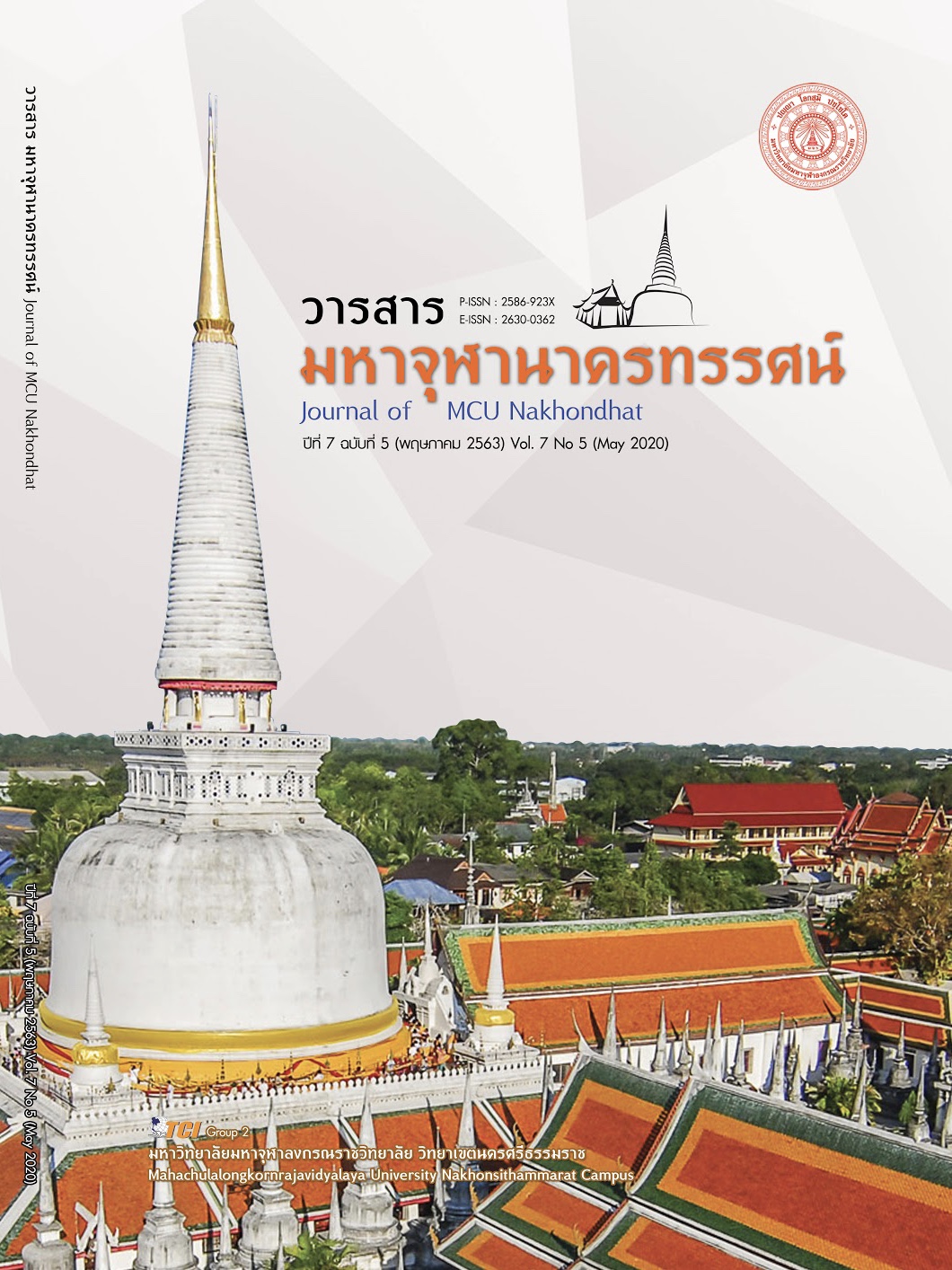AN APPLICATION OF THE PRINCIPLE OF LIKELIHOOD INTO STABILIZING THAI FAMILY IN A SOCIETY OF DIGITAL AGE
Main Article Content
Abstract
The objectives of this article were: 1) to study the states of problem of Thai family in a society of Digital age, 2) to study the principle of Likelihood in Theravada Buddhism in being stabilized Thai family, and 3) to apply the principle of Likelihood into stabilizing Thai family in a society of Digital age. This is a qualitative research focusing on documentary study and in-depth interview. From 15 key informants / person (Family 10, Subdistrict Administrative Organization 1, Temple 2, School 2,) Research instruments Is an in-depth interview Analyze descriptive data.
In the research, it was found that: 1) The states of problem of Thai family in a society of Digital age showed that the Digital society has introduced the radical development of information technology giving rise to the rapid change to structural systems and human being’s relationship where the roles of Thai family institution have been unavoidably affected by such changes. As a result, it is necessary for parent relatives to adjust relationship among them and their children to the proper place in spite of their different ages so that they can live together happily and meaningfully. 2) The principle of Likelihood in Theravada Buddhism being stabilized Thai family in a society of Digital age was found that Buddhism assigns the practical ways giving rise to three kinds of the most advantageous values: 1) Ditthadhammikattha; it refers to the present benefit one should make effort to obtain, 2) Samparãyikattha; it refers to the future benefit, and 3) Paramattha; it refers to the highest good. 3) The guidelines to apply the principle of Likelihood in Theravada Buddhism into stabilizing Thai family in a society of Digital age showed that there were four kinds of problem: 1) the solution is not given according to the knowledge of Digital media, 2) the solution of imitative behaviour of youth consumerists on media should be done, 3) the solution of media-creator and of consumerists’ lack of morality and ethics should be done, and 4) problems on pornographically made – media should be solved through the application of the principle of Likelihood into creating such media.
Article Details
References
พระครูวิจิตรธรรมานนท์ (ฮงทอง). (2554). พฤติกรรมการดำเนินชีวิตในสังคมตามหลักสัมมาอาชีวะของชุมชนในเขตตำบลบก อำเภอโนนคูณ จังหวัดศรีสะเกษ. ใน วิทยานิพนธ์พุทธศาสตรมหาบัณฑิต สาขาวิชาพระพุทธศาสนา.
มหาวิทยาลัยมหาจุฬาลงกรณราชวิทยาลัย.
พระธานี เขมธมฺโม (จำปา). (2550). สัมมาอาชีวะในพระพุทธศาสนา. ใน วิทยานิพนธ์พุทธศาสตรมหาบัณฑิต สาขาวิชาพระพุทธศาสนา. มหาวิทยาลัยมหาจุฬาลงกรณราชวิทยาลัย.
มหาจุฬาลงกรณราชวิทยาลัย. (2539). พระไตรปิฎกภาษาไทย ฉบับมหาจุฬาลงกรณราชวิทยาลัย. กรุงเทพมหานคร: โรงพิมพ์มหาจุฬาลงกรณราชวิทยาลัย.
วิชาญ ทรายอ่อน. (2563). Academic focus ประเทศไทย 4.0. เรียกใช้เมื่อ 29 ธันวาคม 2562 จาก https://library2.parliament.go.th/ejournal/content_af/
2559/jul2559-5.pdf.
สุวิทย์ เมษินทรีย์. (2563). Thailand 4.0: สร้างความเข้มแข็งจากภายในเชื่อมโยงเศรษฐกิจไทยสู่โลก. เรียกใช้เมื่อ 6 ธันวาคม 2562 จาก https://www.facebook.com/
drsuvitpage/posts/ 1396306724009387.


